Treating Your OCD with Exposure and
Response (Ritual) Prevention Therapy

EDITOR-IN-CHIEF
David H. Barlow, PhD
SCIENTIFIC ADVISORY BOARD
Anne Marie Albano, PhD
Gillian Butler, PhD
David M. Clark, PhD
Edna B. Foa, PhD
Paul J. Frick, PhD
Jack M. Gorman, MD
Kirk Heilbrun, PhD
Robert J. McMahon, PhD
Peter E. Nathan, PhD
Christine Maguth Nezu, PhD
Matthew K. Nock, PhD
Paul Salkovskis, PhD
Bonnie Spring, PhD
Gail Steketee, PhD
John R. Weisz, PhD
G. Terence Wilson, PhD
Treating Your OCD
with Exposure and
Response (Ritual)
Prevention Therapy
W o r k b o o k
Second Edition
Elna Yadin Edna B. Foa Tracey K. Lichner


Oxford University Press, Inc., publishes works that further
Oxford Universitys objective of excellence in research, scholarship, and education.
Oxford New York
Auckland Cape Town Dar es Salaam Hong Kong Karachi
Kuala Lumpur Madrid Melbourne Mexico City Nairobi
New Delhi Shanghai Taipei Toronto
With offices in
Argentina Austria Brazil Chile Czech Republic France Greece
Guatemala Hungary Italy Japan Poland Portugal Singapore
South Korea Switzerland Thailand Turkey Ukraine Vietnam
Copyright 2012 by Oxford University Press, Inc.
Published by Oxford University Press, Inc.
198 Madison Avenue, New York, New York 10016
www.oup.com
Oxford is a registered trademark of Oxford University Press
All rights reserved. No part of this publication may be reproduced, stored in a retrieval system, or transmitted, in any form or by any means, electronic, mechanical, photocopying, recording, or otherwise, without the prior permission of Oxford University Press.
ISBN-13 9780195335293 Paper
About TreatmentsThatWork
One of the most difficult problems confronting patients with various disorders and diseases is finding the best help available. Everyone is aware of friends or family who have sought treatment from a seemingly reputable practitioner, only to find out later from another doctor that the original diagnosis was wrong or the treatments recommended were inappropriate or perhaps even harmful. Most patients, or family members, address this problem by reading everything they can about their symptoms, seeking out information on the Internet, or aggressively asking around to tap knowledge from friends and acquaintances. Governments and healthcare policymakers are also aware that people in need dont always get the best treatmentssomething they refer to as variability in healthcare practices.
Now healthcare systems around the world are attempting to correct this variability by introducing evidence-based practice. This simply means that it is in everyones interest that patients get the most up-to-date and effective care for a particular problem. Healthcare policymakers have also recognized that it is very useful to give consumers of healthcare as much information as possible, so that they can make intelligent decisions in a collaborative effort to improve health and mental health. This series, Treatments That Work , is designed to accomplish just that. Only the latest and most effective interventions for particular problems are described, in user-friendly language. To be included in this series, each treatment program must pass the highest standards of evidence available, as determined by a scientific advisory board. Thus, when individuals suffering from these problems or their family members seek out an expert clinician who is familiar with these interventions and decides that they are appropriate, they will have confidence that they are receiving the best care available. Of course, only your healthcare professional can decide on the right mix of treatments for you.
This workbook is written for people with obsessive-compulsive disorder (OCD) who are interested in learning how to control their obsessional thoughts and compulsive rituals using a treatment called Exposure and Ritual Prevention (EX/RP).
You may have been invited to read this book by your clinician who plans to teach you EX/RP, which has been proven effective in reducing OCD symptoms in numerous scientific studies. Or you might be reading this book because you are curious about how you might use EX/RP to learn how to better manage your symptoms.
This EX/RP treatment program is broken down into 17 to 20 biweekly treatment sessions, during which you will be exposed to situations and places that trigger your OCD symptoms. These exposures are designed to be gradual so that over time you come to realize that the things you fear will not necessarily occur if you do not perform your rituals. Some exposures will be supervised by your therapist, but you will also be asked to practice on your own at home.
Although some individuals do not respond as well as we would hope, EX/RP is the single most effective treatment for OCD available, and offers you the best chance for recovery. If you are motivated to engage in treatment, there is a very good chance you will experience a decrease in your symptoms and potential mastery over your OCD.
David H. Barlow, Editor-in-Chief,
Treatments ThatWork
Boston, MA
Acknowledgments
I want to acknowledge the contribution of Dr. Michael Kozak to my conceptualization of the psychopathology that underlies OCD and the mechanisms that underlie exposure and ritual prevention, which are explicated in the manual. Indeed, the present manual is an update and expansion of a previous manual, Mastery of Your Obsessions and Compulsions, coauthored by Dr. Kozak and myself. I also want to thank Drs. Michael Leibowitz and Blair Simpson for the insight they provided into my view of OCD through many years of collaborations. My thanks are extended to my collaborators at the Center for the Treatment and Study of Anxiety over the past 30 years. Lastly, I want to thank the patients who taught me so much about how to help them.
-Edna B. Foa
To my dear family and friends who taught me about loyalty and generosity; to my colleagues, past and present, whose work is incorporated in this book; and last, but not least, to our patients, together with whom we have learned about struggle, compassion, and triumph.
-Elna Yadin
To my wonderful, vibrant sistersyou keep alive the determined spirit of our parents, and your love, encouragement, and friendship mean the world to me.
-Tracey K. Lichner
Contents
Goals
 Understand the nature of obsessive-compulsive disorder (OCD)
Understand the nature of obsessive-compulsive disorder (OCD)
 Learn how OCD is treated
Learn how OCD is treated
OCD: Some Facts
OCD is a neuropsychological disorder that includes two characteristics: (1) Obsessions, which are recurrent and persistent thoughts, impulses, or images that are experienced as intrusive and inappropriate and cause marked anxiety or distress, and (2) Compulsions (or rituals), which are repetitive behaviors, thoughts, or images that the person feels compelled to perform in response to an obsession or a certain rule that must be applied rigidly. Most of the time there is a relationship between the compulsion and the obsession in that the compulsion is performed to neutralize or reduce the distress that accompanies the obsession.
Next page

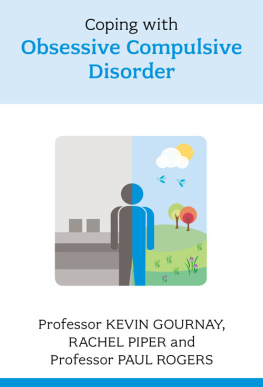
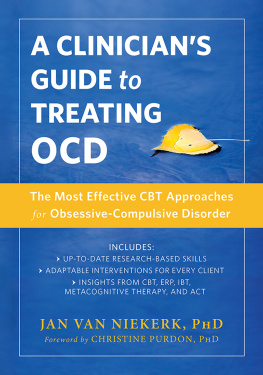
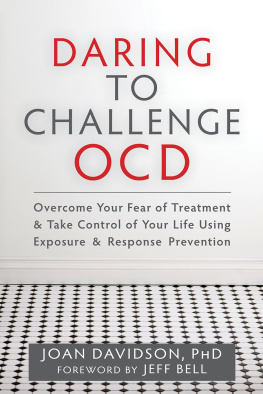
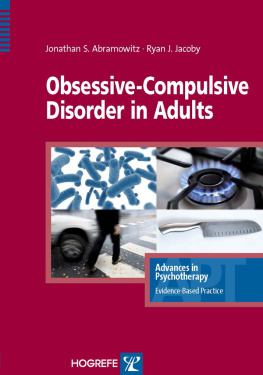
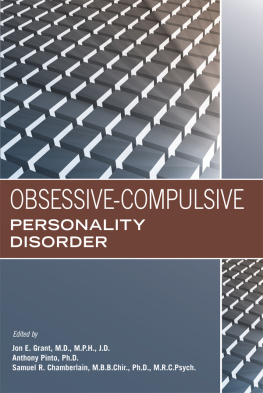
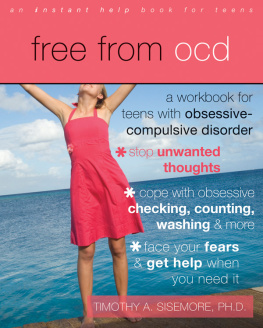
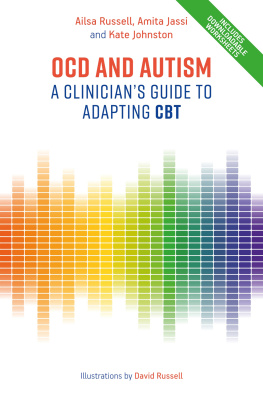
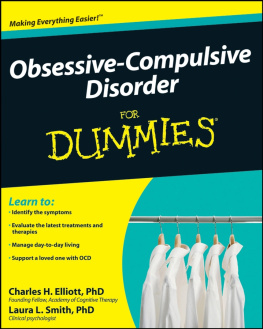
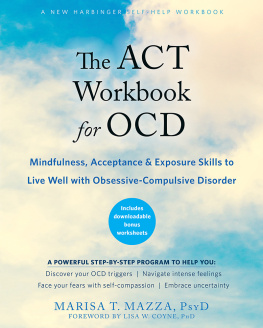
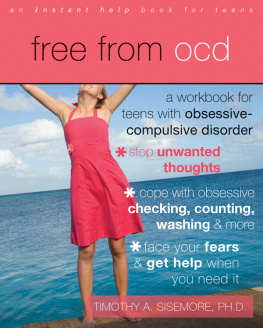


 Understand the nature of obsessive-compulsive disorder (OCD)
Understand the nature of obsessive-compulsive disorder (OCD)